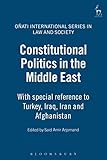Constitutional politics in the Middle East : with special reference to Turkey, Iraq, Iran, and Afghanistan / edited by Saïd Amir Arjomand.
Material type: TextSeries: Oñati international series in law and society: Publisher: Oxford [England] ; Portland, Or. : Hart Pub., 2008Description: xii, 210 pages ; 24 cmContent type: text Media type: unmediated Carrier type: volumeISBN: 9781841137742; 184113774X; 9781841137735; 1841137731Subject(s): Constitutional law -- Middle East | Constitutional law (Islamic law) | Middle East -- Politics and government | Constitutional law | Constitutional law (Islamic law) | Politics and government | Middle East | Verfassungsrecht | Staatsrecht | Politik | Islamisches Recht | Türkei | Irak | Iran | AfghanistanDDC classification: 342.56 LOC classification: KMC524 | .C66 2008
TextSeries: Oñati international series in law and society: Publisher: Oxford [England] ; Portland, Or. : Hart Pub., 2008Description: xii, 210 pages ; 24 cmContent type: text Media type: unmediated Carrier type: volumeISBN: 9781841137742; 184113774X; 9781841137735; 1841137731Subject(s): Constitutional law -- Middle East | Constitutional law (Islamic law) | Middle East -- Politics and government | Constitutional law | Constitutional law (Islamic law) | Politics and government | Middle East | Verfassungsrecht | Staatsrecht | Politik | Islamisches Recht | Türkei | Irak | Iran | AfghanistanDDC classification: 342.56 LOC classification: KMC524 | .C66 2008| Item type | Current library | Call number | Copy number | Status | Notes | Date due | Barcode |
|---|---|---|---|---|---|---|---|
 Books
Books
|
Female Library | KMC524 .C66 2008 (Browse shelf (Opens below)) | 1 | Available | STACKS | 51952000211006 | |
 Books
Books
|
Main Library | KMC524 .C66 2008 (Browse shelf (Opens below)) | 1 | Available | STACKS | 51952000210993 |
Browsing Main Library shelves Close shelf browser

|

|

|

|

|

|

|
||
| KKH2467.M56 .P56 2015 The legal treatment of Muslim minorities in Italy : Islam and the neutral state / | KM575.5.W66 .G46 2016 Gender, violence and the state in Asia / | KMC514 .R855 2013 The rule of law, Islam, and constitutional politics in Egypt and Iran / | KMC524 .C66 2008 Constitutional politics in the Middle East : with special reference to Turkey, Iraq, Iran, and Afghanistan / | KMC747 .T33 2017 Lex Petrolea and international investment law : law and practice in the Persian Gulf / | KMC79 .M35 2007 Introduction to Middle Eastern law / | KMC79 .M35 2007 Introduction to Middle Eastern law / |
Includes bibliographical references and index.
Introduction / Saïd Amir Arjomand -- Islamic empires, the Ottoman Empire and the circle of justice / Linda T. Darling -- Islam and constitutionalism since the nineteenth century : the significance and peculiarities of Iran / Saïd Amir Arjomand -- Bargaining and imposing constitutions : private and public interests in the Iranian, Afghani, and Iraqi constitutional experiments / Nathan J. Brown -- The respective roles of human rights and Islam : an unresolved conundrum for Middle Eastern constitutions / Ann Elizabeth Mayer -- The guardian of the regime : the Turkish constitutional court in comparative perspective / Hootan Shambayati -- Constitution, legitimacy and democracy in Turkey / Mehmet Fevzi Bilgin -- Crafting a constitution for Afghanistan / Barnett R. Rubin -- From interim to 'permanent' constitution in Iraq / Andrew Arato.
"This book is the first comparative and interdisciplinary study of constitutional politics and constitution-making in the Middle East. The historical background and setting are fully explored in two substantial essays by Linda Darling and Said Amir Arjomand, placing the contemporary experience in the contexts, respectively, of the ancient Middle Eastern legal and political tradition and of nineteenth and twentieth century legal codification and political modernisation. These are followed by Ann Mayer's general analysis of the treatment of human rights in relation to Islam in Middle Eastern constitutions, and Nathan Brown's comparative scrutiny of the process of constitution-making in Iran, Afghanistan and Iraq with reference to the available constitutional theories which are shown to throw little or no light on it. The remaining essays are country by country case studies of Turkey, Afghanistan and Iraq, the case of Iran having been covered by Arjomand as the special point of reference."--Jacket.
1 2

There are no comments on this title.